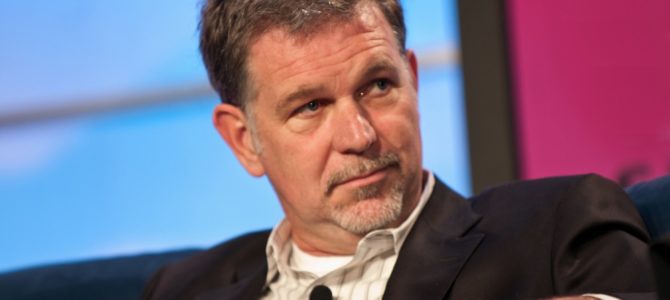Netflix CEO Reed Hastings isn’t making much sense. Back in January, his company pulled an episode of Hasan Minhaj’s “Patriot Act” in Saudi Arabia after the country’s government complained. Minhaj was sharply critical of Crown Prince Mohammed Bin Salman in the episode.
“We strongly support artistic freedom and removed this episode only in Saudi Arabia after we had received a valid legal request — and to comply with local law,” Netflix said at the time.
Asked last week at The New York Times DealBook conference why Netflix complied with the Saudi government’s request, Hastings went beyond that initial explanation. “Well, we’re not in the news business,” he replied. “We’re not trying to do ‘truth to power.’ We’re trying to entertain. And we can pick fights with governments about newsy topics, or we can say, because the Saudi government lets us have us shows like ‘Sex Education,’ that show a very liberal lifestyle, and show very provocative and important topics.”
“And so,” Hastings continued, “we can accomplish a lot more by being entertainment, and influencing a global conversation about how people live, than trying to be another news channel.”
The implied argument is (1) that non-news entities can prioritize entertainment over speaking “truth to power,” as though they’re mutually exclusive, and (2) that Netflix can “accomplish a lot more” with cultural commentary than with outright political commentary. According to Hastings, the cost-benefit analysis favored compliance in Minhaj’s case because the Saudis allow Netflix to broadcast shows that promote “very liberal lifestyle[s].”
These are separate claims. The first is silly. Minhaj’s program is cut roughly from the “Daily Show” mold, featuring news delivery alongside analysis and opinion. Netflix, therefore, is in the news business. Sure, Hastings is right the company is not exclusively a “news channel,” but the platform hosts content that puts it in the “news business,” whether executives like it or not. Typically, political commentators and their sponsors don’t roll over when foreign governments complain about bad coverage.
The very purpose of shows like “Patriot Act” is to “entertain” and speak “truth to power” at the same time. ” It’s a rich tradition!
Hastings’s second argument, that it’s better to maintain a relationship with the Saudis that allows for shows like “Sex Education” to air in the country than hold the line on an episode of “Patriot Act,” is at least less muddled. In the long term, Hastings is right that culture is more powerful than politics. But principles matter, and that logic still excuses the decision to let a dictator censor critical coverage of himself. If Netflix doesn’t want to stand up for its political coverage, the platform simply shouldn’t host it.
Hastings’s lacking explanation leaves the impression he’s more interested in keeping the company in the Saudi market for financial reasons than influencing the country’s culture with “Sex Education.” Here we have another example of the woke capitalist’s moral bankruptcy: Netflix, a company that was happy to jump on the bandwagon and threaten a departure from Georgia over pro-life legislation, censored its political content at the request of a dictator.









